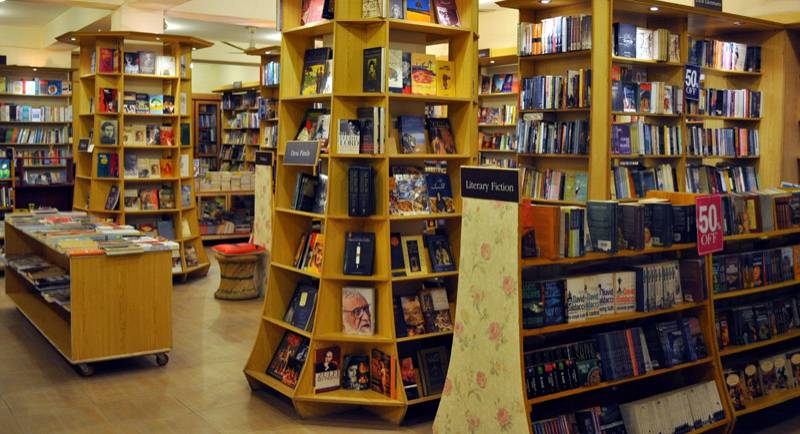
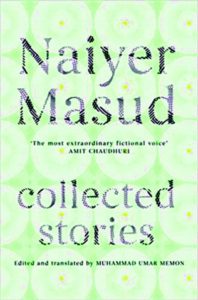
Collected Stories
Naiyer Masud
Penguin Books 2015
Rs1,796
A malfunctioning weathervane forces the wind to realign itself. A collector travels all over the world tracking down tools used in crimes against corpses. A gardener frets over the consequences of stealing the Navab of Lucknow’s prized myna. Minutiae and mystery form the warp and weft of Naiyer Masud’s densely woven, enchantingly hypnotic stories, combining precisely delineated characters and objects with accounts of inexplicable phenomena and the arcane arts. Compiled and introduced by the acclaimed Urdu scholar Muhammad Umar Memon, this edition collects all thirty-five of Masud’s stories for the first time, establishing him as one of the most original voices to emerge in world literature in the past few decades.
Naiyer Masud (born in 1936) is an Urdu scholar and Urdu-language short story writer. He is the author of many scholarly books and translations (notably of Kafka), but is best known for his short stories, collected in the volumes Ganjifa, Simiya, Itr-e-kaafoor, and Taoos Chaman Ki Myna. For the last, he was awarded the 2001 Urdu prize of the Sahitya Akademi and the Saraswati Samman in 2007. He received the honor of being the subject of the entire 1997 issue of the Annual of Urdu Studies. A large selection of his stories have been translated into English by M.U. Memon in the volumes The Snake Catcher and Essence of Camphor.

The President’s Book of Secrets: The Untold Story of Intelligence Briefings to America’s Presidents from Kennedy to Obama
David Priess
PublicAffairs (2016)
Rs2,695
Every president has had a unique and complicated relationship with the intelligence community. While some have been coolly distant, even adversarial, others have found their intelligence agencies to be among the most valuable instruments of policy and power.
Since John F. Kennedy’s presidency, this relationship has been distilled into a personalized daily report: a short summary of what the intelligence apparatus considers the most crucial information for the president to know that day about global threats and opportunities. This top-secret document is known as the President’s Daily Brief, or, within national security circles, simply “the Book.” Presidents have spent anywhere from a few moments (Richard Nixon) to a healthy part of their day (George W. Bush) consumed by its contents; some (Bill Clinton and George H. W. Bush) consider it far and away the most important document they saw on a regular basis while commander in chief.
The details of most PDBs are highly classified, and will remain so for many years. But the process by which the intelligence community develops and presents the Book is a fascinating look into the operation of power at the highest levels. David Priess, a former intelligence officer and daily briefer, has interviewed every living president and vice president as well as more than one hundred others intimately involved with the production and delivery of the president’s book of secrets. He offers an unprecedented window into the decision making of every president from Kennedy to Obama, with many character-rich stories revealed here for the first time.
Dr. David Priess served during the Bill Clinton and George W. Bush administrations as an award-winning intelligence officer, manager, and daily intelligence briefer at the CIA, as well as a desk officer at the State Department. He obtained his PhD in political science from Duke University and has published articles in journals such as Security Studies, Middle East Policy, and the Mershon International Studies Review, as well as book reviews and eclectic articles in outlets ranging from Foreword to Skeptic. Priess is currently director of analytic services for Analytic Advantage, Inc., offering specialized training, mentoring, and consulting services to the intelligence community, other government offices, and the private sector.
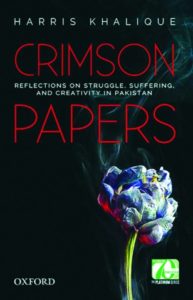
Crimson Papers: Reflections on Struggle, Suffering, and Creativity in Pakistan
Harris Khalique
OUP (2017)
Rs995
The book provides insights into the society, polity, and literary ethos of Pakistan within the broader South Asian context. An attempt has been made to place the issues faced by Pakistan and South Asian Muslim societies in the current global human condition which is increasingly defined by terrorism, invasions, absolutism, and inequality. Although the essays encompass a broad canvas, they also possess a definite focus capturing Pakistan’s social and political history from the beginning to the present times, including how people are impacted by major political upheavals and social events, and how some individuals contribute in shaping both events and narratives. Within the broader narrative is woven an analysis of religious extremism, sectarianism, persecution of minorities, ethnic strife, provincial separatism, and shrinking of cultural and intellectual space.
Harris Khalique’s erudition and breadth of vision, indeed, are breathtaking, said Dr Tariq Rahman in a review. Such a book—so readable and yet so learned—was long overdue as an antidote to the textbooks we teach and the sound bites which pass for wisdom in our media. Crimson Papers should be compulsory reading for all Pakistanis and those interested in Pakistan. It is a landmark in our intellectual life as a nation.
Writer, critic, and literary historian Dr Rakhshanda Jalil says: The personal, we have been told, is the political. This collection of evocatively written essays—culled from a rich lode of history, literature, memory, and politics—shows us exactly how, and why.
Harris Khalique is a leading Urdu and English language poet from Pakistan. He is also an essayist and columnist. During the 1980s and 1990s, some of his poems faced censorship in Pakistan. His works have been translated into several languages. He is a University of Iowa Honorary Fellow in Writing and has spoken widely on themes straddling culture, politics, human rights, and international development.
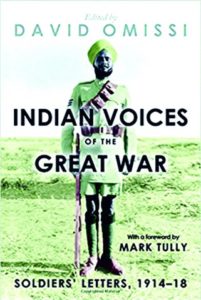
Indian voices of the Great War: Soldiers’ letters, 1914-18
David Omissi
Penguin Books (2014)
Rs1,195
During the first World War, a great deal of the lives and experiences of Indian soldiers who served in Europe, were revealed through the letters they wrote to their families. The censors who monitored the letters also kept the translated excerpts. Even if the original letters will likely never be recovered, these excerpts held by the India Office records can be accessed. Indian Voices is a collection of letters by Indian soldiers who served in France from 1914 to 1918. The letters provide readers with a glimpse of the culture shock that the soldiers faced while stationed in France. They bear witness to the soldiers’ unsettling encounter with Europe and its culture. Many of the soldiers may not have been able to read or write, so their letters were written by scribes. Some of the letters included are: from a Muhammadan of the Punjab, who was serving as a packer in the Indian base post office, Boulogne, to his friend in Rawalpindi from a Sikh in a cavalry regiment serving in France to a friend at Loralai, a Mahratta clerk at Bournemouth to a friend at Sholapur and from a Sikh clerk with the 47th Sikhs, serving in France, to his sister. Indian voices was published by Penguin Books in 2014 but this hardcover also includes a foreword by Mark Tully.
David Omissi is Senior Lecturer in History at the University of Hull. Before moving to Hull he was Prize Research Fellow at Nuffield College, Oxford. His other books include Indian Voices of the Great War (Macmillan, 1999).
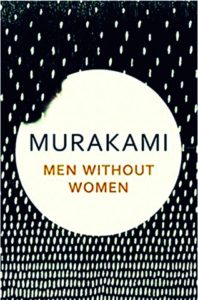
Men Without Women: Stories
Haruki Murakami
Knopf (2017),
Rs1,545
A dazzling new collection of short stories—the first major new work of fiction from the beloved, internationally acclaimed, Haruki Murakami since his No. 1 best-selling Colorless Tsukuru Tazaki and His Years of Pilgrimage.
Across seven tales, Haruki Murakami brings his powers of observation to bear on the lives of men who, in their own ways, find themselves alone. Here are vanishing cats and smoky bars, lonely hearts and mysterious women, baseball and the Beatles, woven together to tell stories that speak to us all.
Marked by the same wry humor that has defined his entire body of work, in this collection Murakami has crafted another contemporary classic.
Haruki Murakami was born in Kyoto in 1949 and now lives near Tokyo. His work has been translated into more than fifty languages, and the most recent of his many international honors is the Jerusalem Prize, whose previous recipients include J. M. Coetzee, Milan Kundera, and V. S. Naipaul.

